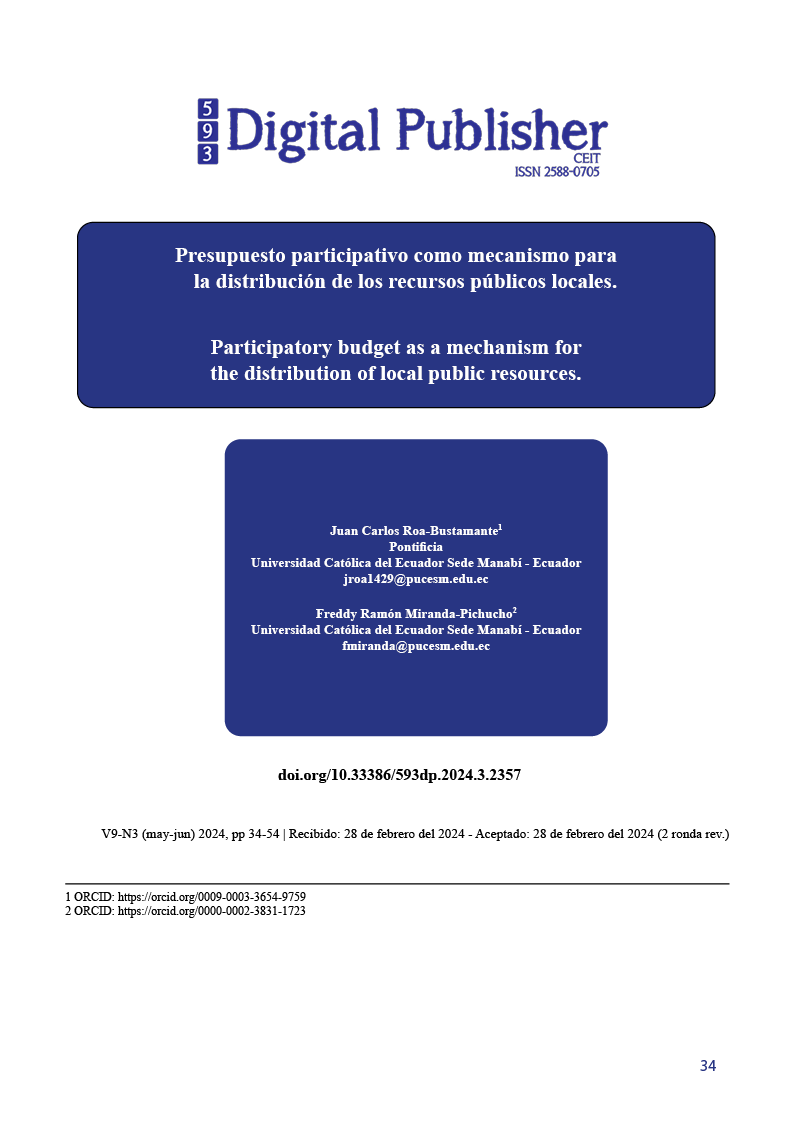Participatory budget as a mechanism for the distribution of local public resources
Main Article Content
Abstract
It is crucial to address uncertainties about the ability of participatory budgeting to significantly influence the distribution of public resources. For this reason, the research aimed to interpret participatory budgeting as a mechanism of citizen participation for the efficient allocation of local public resources, specifically in the cantonal and parish Autonomous Decentralized Governments of Puyango. Employing a qualitative and inductive approach through a documentary review strategy, the research triangulated reviewed theories, author criteria, and semi-structured interviews with key stakeholders. The research adopted a descriptive approach to delve into elements and their categories and to understand the origin of concepts and their meanings in specific contexts. The interviewees played a crucial role in strengthening the information gathered about the participatory budgeting process in the distribution of public resources in both urban and rural sectors, where civil society is pivotal in decision-making. The analysis was conducted using Grounded Theory, along with hermeneutics, allowing for a comprehensive interpretation of information provided by stakeholders, theory, and researchers' criteria in the application of participatory budgeting through their active experiences. This approach helped determine emerging categories related to citizen participation, the process of citizen participation, priority results and projects, equitable distribution between urban and rural areas, the impact of infrastructure and services, active community participation, achievements and challenges, and social awareness.
Downloads
Article Details

This work is licensed under a Creative Commons Attribution-NonCommercial-ShareAlike 4.0 International License.
1. Derechos de autor
Las obras que se publican en 593 Digital Publisher CEIT están sujetas a los siguientes términos:
1.1. 593 Digital Publisher CEIT, conserva los derechos patrimoniales (copyright) de las obras publicadas, favorece y permite la reutilización de las mismas bajo la licencia Licencia Creative Commons 4.0 de Reconocimiento-NoComercial-CompartirIgual 4.0, por lo cual se pueden copiar, usar, difundir, transmitir y exponer públicamente, siempre que:
1.1.a. Se cite la autoría y fuente original de su publicación (revista, editorial, URL).
1.1.b. No se usen para fines comerciales u onerosos.
1.1.c. Se mencione la existencia y especificaciones de esta licencia de uso.
References
Annunziata, R. (2011). “Proximidad”, representación y participación. El Presupuesto Participativo en Argentina. FLACSO sede Ecuador. https://repositorio.flacsoandes.edu.ec/bitstream/10469/3022/1/RFLACSO-I40-04.pdf
Asamblea Nacional del Ecuador. ((20 de octubre de 2008). Constitución de la República del Ecuador. En A. Constituyente, Constitución de la República del Ecuador. Montecristi. Registro Oficial No. 449 de 20 de octubre de 2008
Buele, Nugra, I. G. (2021). El Presupuesto Participativo como mecanismo de democracia directa. Modelo de implementación y monitoreo. Caso del Gobierno Autónomo Descentralizado de Gualaquiza, Ecuador. Universidad Politécnica de Madrid, Tesis Doctoral. https://doi.org/10.20868/UPM.thesis.68480
Asamblea Nacional del Ecuador (2010). Código Orgánico de Ordenamiento Territorial, Autonomía y Descentralización. Montecristi. Registro Oficial No. Suplemento No 303 de 19 de octubre de 2010.
Consejo de Participación Ciudadana y Control Social (2016). Metodología para la construcción del presupuesto participativo en el marco del sistema de participación. chrome-extension://efaidnbmnnnibpcajpcglclefindmkaj/https://www.cpccs.gob.ec/wp-content/uploads/2016/02/Presupuestos-participativos2.pdf
Gadamer, H-G (2000). El Método Hermenéutico. https://www.redalyc.org/pdf/998/99815918009.pdfhttp://www.scielo.org.co/pdf/esupb/v29n62/0120-1263-esupb-29-62-17.pdf
Ganuza Fernández, E. & Francés García, F. (2012). El círculo virtuoso de la democracia: los presupuestos participativos a debate (2012). DIGITAL.CSIC. https://digital.csic.es/handle/10261/78343
García Bátiz, M. L., & Téllez Arana, L. (2018). El presupuesto participativo: un balance de su estudio y evolución en México. Perfiles Latinoamericanos. https://doi.org/10.18504/pl2652-012-2018.
Gianpaolo Baiocchi & Ernesto Ganuza. (2014). Participatory Budgeting as if Emancipation Mattered. Politics y Society. https://journals.sagepub.com/doi/abs/10.1177/0032329213512978
González Gil, Teresa y Alejandra Cano Arana (2010). Introducción al análisis de datos en investigación cualitativa: concepto y características (I), en Nure Investigación, núm. 44, enero-febrero. http://biblioteca.udgvirtual.udg.mx/jspui/bitstream/123456789/3832/1/Introducci%C3%B3n_an%C3%A1lisis_datos_investigaci%C3%B3n_cualitativa.pdf
Guevara Alban, G. P., Verdesoto Arguello, A. E., & Castro Molina, N. E. (2020). Metodologías de investigación educativa (descriptivas, experimentales, participativas, y de investigación-acción). RECIMUNDO, 4(3), 163-173. https://doi.org/10.26820/recimundo/4.(3).julio.2020.163-173
Hernández Sampieri, Roberto, Carlos Fernández Collado y Pilar Baptista Lucio (2004). Metodología de la investigación. Tercera edición, España, McGraw-Hill Interamericana. https://d1wqtxts1xzle7.cloudfront.net/38911499/Sampieri-libre.pdf?
Huarac, Q. Diaz, M, & Cuba, M. (2022). Presupuesto participativo y gestión del gasto público. Universidad de Zulia. https://www.redalyc.org/journal/280/28071845023/html/
Montecinos, E. (2012). Democracia y presupuesto participativo en América Latina. La mutación del presupuesto participativo fuera de Brasil. Reforma y Democracia, 53, 61-96. Obtenido de https://www.redalyc.org/pdf/3575/357533685003.pdf
Norman K. Denzin, K. & Lincoln, Y. (2012). Manual de investigación cualitativa. Gedisa. https://dialnet.unirioja.es/servlet/libro?codigo=490631
Pagani, M. (2012). La participación ciudadana para la mejora de la gestión local: realidades, mitos y desafíos sobre los Presupuestos Participativos. Cuestiones de Sociología. http://sedici.unlp.edu.ar/bitstream/handle/10915/33623/Documento_completo.pdf?sequence=1&isAllowed=y DIGITAL.CSIC
Pilay, T. & Ugando, P. (2020). Presupuesto participativo en gobiernos autónomos descentralizados municipales de la provincia Santo Domingo de los Tsáchilas – Ecuador. ECA Sinergia. https://www.redalyc.org/journal/5885/588564791012/html/
Presidencia de la Republica del Ecuador. (2010). Ley Orgánica de Participación Ciudadana, 2010, Registro oficial 175. https://www.oas.org/juridico/pdfs/mesicic4_ecu_org6.pdf
Robles, B. (2011). Métodos cualitativos de investigación. La entrevista en profundidad: una técnica útil dentro del campo antropofísico. Cuicuilco. https://www.scielo.org.mx/scielo.php?script=sci_arttext&pid=S0185-16592011000300004
Ruiz, Pozo, L. ( Sf.). Marco conceptual sobre presupuesto participativo. LFLACSO. https://biblio.flacsoandes.edu.ec/libros/114431-opac
Secretaría Nacional de Planificación y Desarrollo. (2012). Modelo de Equidad Territorial en la Provisión de Bienes y Servicios Públicos: Análisis de las transferencias a los GAD en el período 2011-2013. (E. S.A, Ed.) Quito, Pichincha: Editogran. Banco de Desarrollo del Ecuador, Sistema de información municipal-WEB-SIM -2010. Página www.eltelegrafo.com.ec: https://www.eltelegrafo.com.ec/
Strauss A, & Corbin J. (2022). Bases de la investigación cualitativa. Técnicas y procedimientos para desarrollar la teoría fundamentada. Ed. Universidad de Antioquia. https://diversidadlocal. files.wordpress.com/2012/09/bases-investigacion-cualitativa.pdf
Ulin, Priscilla, Elizabeth T. Robinson y Elizabeth E. Tolley (2006). Investigación aplicada en salud pública, USAID/OPS/FHI. https://iris.paho.org/bitstream/handle/10665.2/729/9275316147.pdf
Vargas, I. (2012). La entrevista en la investigación cualitativa: Nuevas tendencias y retos. Revista Calidad en la Educación Superior, Universidad de Costa Rica, Vol.3. Obtenido de file:///C:/Users/HP/Downloads/Dialnet-LaEntrevistaEnLaInvestigacionCualitativa-3945773%20(1).pdf
Varguillas, C. (2006). El uso de atlas. Ti y la creatividad del investigador en el análisis cualitativo de contenido upel. Revista Laurus, Universidad Pedagógica Experimental Libertador. Obtenido de chrome-extension://efaidnbmnnnibpcajpcglclefindmkaj/https://www.redalyc.org/pdf/761/76109905.pdf



